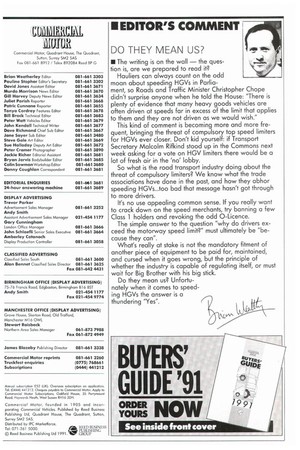DO THEY MEAN US?
Page 5

If you've noticed an error in this article please click here to report it so we can fix it.
• The writing is on the wall — the question is, are we prepared to read it? Hauliers can always count on the odd moan about speeding HGVs in Parliament, so Roads and Traffic Minister Christopher Chope didn't surprise anyone when he told the I-louse: "There is plenty of evidence that many heavy goods vehicles are often driven at speeds far in excess of the limit that applies to them and they are not driven as we would wish." This kind of comment is becoming more and more frequent, bringing the threat of compulsory top speed limiters for HGVs ever closer. Don't kid yourself: if Transport Secretary Malcolm Rifkind stood up in the Commons next week asking for a vote on HGV limiters there would be a lot of fresh air in the 'no' lobby. So what is the road transport industry doing about the threat of compulsory limiters? We know what the trade associations have done in the past, and how they abhor speeding HGVs...too bad that message hasn't got through to more drivers.
It's no use appealing common sense. If you really want to crack down on the speed merchants, try banning a few Class I holders and revoking the odd 0-Licence. The simple answer to the question "why do drivers exceed the motorway speed limit?" must ultimately be "because they can". What's really at stake is not the mandatory fitment of another piece of equipment to be paid for, maintained, and cursed when it goes wrong, but the principle of whether the industry is capable of regulating itself, or must wait for Big Brother with his big stick. Do they mean us? Unfortu nately when it comes to speed ing HGVs the answer is a thundering "Yes".




































































